
Pennsylvania Environmental Resource Consortium
Inspiring higher education throughout PA to lead transformational sustainability efforts through example, expertise, and collaboration.
2021 Campus Sustainability Champions
The Campus Sustainability Champion title is awarded to students, faculty, administrators, and staff of Pennsylvania colleges and universities who have made meaningful contributions benefiting social, economic and/or environmental sustainability on their campus, in their community, or in society at large. Contributions can be in areas of teaching, research, co-curricular programs, campus culture, community service, and campus operations, including food recovery.
Student Winners: Alex Flowers, Chelsea Semper, and Ananya Bhattacharya Robin Forsha Sebastian McRae Philip Onffroy, Riley DeBaecke, Brooke Dickey, Jeffrey Gibbs, Prism Li, Rain Lu, Haley Scopelliti, and Kalie Yuen Gillian Williams | Non-Student Winners: Eve Bratman Joy Charlton Mihyun Kang Mark Sentesy Andrew Stuhl Terrence Xiao |
Student Winners:
Alex Flowers, Chelsea Semper, and Ananya Bhattacharya, Swarthmore College
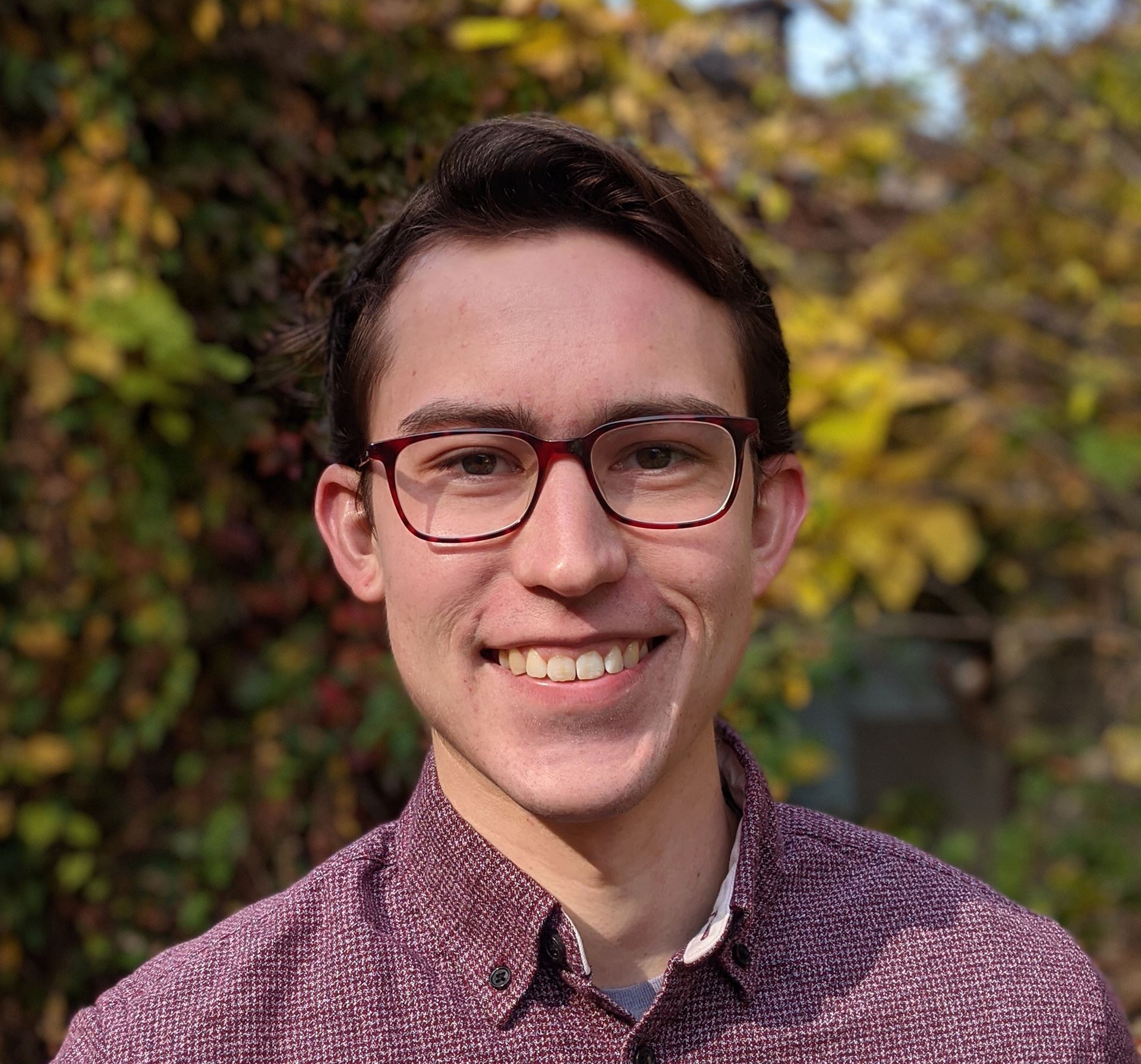

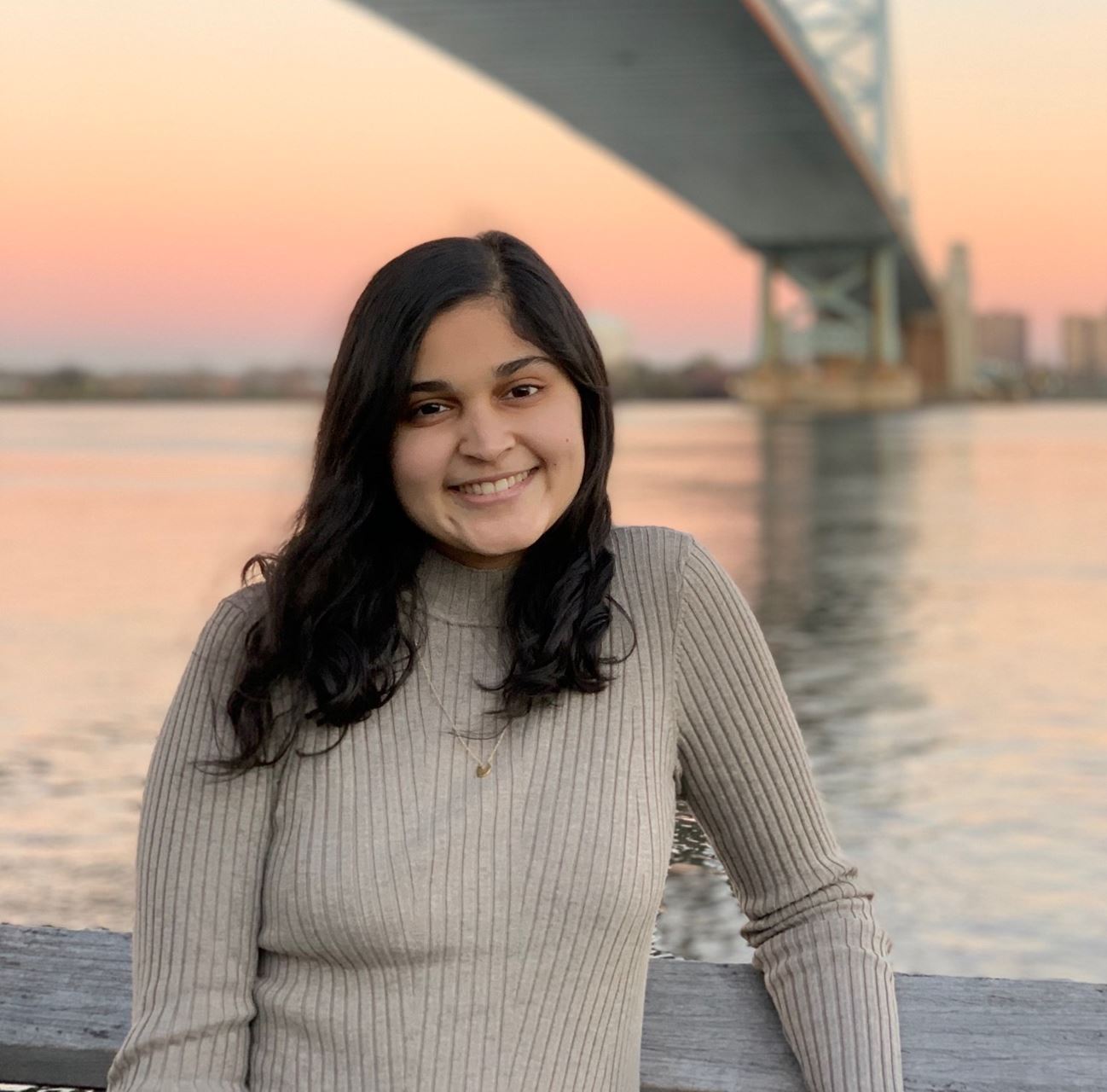
Alex Flowers, Chelsea Semper, and Ananya Bhattacharya are graduating seniors at Swarthmore College, and 2020-2021 President’s Sustainability Research Fellows (PSRF). PSRF pairs student fellows with staff mentors to implement sustainability projects focused on institutional change at the College. Alex’s project - ‘Sustainable Space Utilization’ - created a framework for how campus spaces are conceptualized and used, and will help inform how the College approaches space-related projects and decisions, such as building construction, maintenance, and renovation. Chelsea’s project - ‘Crum Woods Stewardship’ - created an ecological restoration plan for a sewage pipeline right-of-way in the Crum Woods and hosted a restorative tree planting event. Her work was critical in helping the College practice effective and restorative environmental stewardship. Ananya’s project - ‘ChesterSemester’ - helped support the newly established ChesterSemester program, which pairs Swarthmore students with projects and organizations in Chester. Ananya’s work focused on program development and support, helping the College cultivate another platform for environmental justice and engaged scholarship.
Alex, Chelsea, and Ananya demonstrated exemplary diligence, thoughtfulness, and competence throughout the course of the year. They have shown themselves to be excellent communicators, facilitators, and collaborators. As graduating seniors, Alex, Chelsea, and Ananya also acted as peer leaders to their PSRF cohort, supporting their fellow PSRF students and volunteering to take on helpful roles in their projects, such as being a note-taker for a meeting or activity. We are so proud of their work, growth, and the myriad of ways in which they truly embody the spirit of being ‘Campus Sustainability Champions’ at Swarthmore!
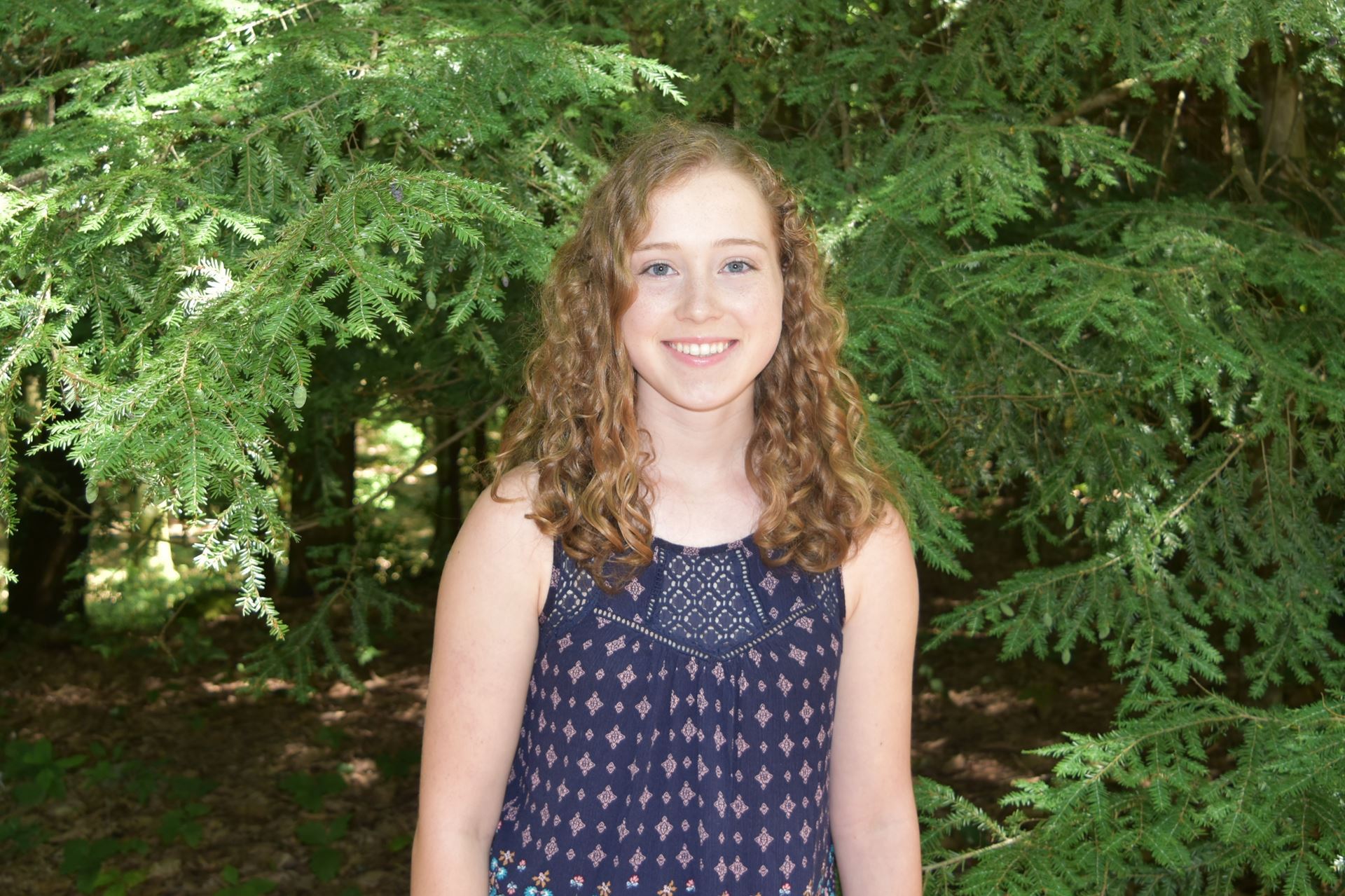
Robin made her first impression at Allegheny when she attended a summer residential camp for high schoolers called Creek Camp. She was a standout camper who made clear her interest in aquatic ecology and desire to learn more. Subsequently as a student at Allegheny, she has actualized her passion for aquatic environments by becoming an active member of Creek Connections, an environmental education outreach program of the college. She has participated significantly in numerous Creek Connection educational programs for local K-12 students, as well as the annual Creek Symposium, which routinely draws more than 300 students. She leads students in water quality monitoring using water chemistry test kits as well as aquatic macroinvertebrate sampling. She works extremely well in one-on-one situations, helping students to understand the context of the tests they are conducting, learning about aquatic ecology, and making connections between people and the environment. She easily connects with all ages of people. Her love of the environment is infectious. Her quiet demeanor paired with her confidence leads to full audience attention. As a veteran of the program, she has been a leader in seeing that the program is run effectively, and has been an excellent trainer of new Allegheny participants in the program. Robin is also very active in the newly-formed Bird Club on campus, which focuses on getting more students interested in birding. Robin is a campus sustainability champion who is dedicated not only to learning more about the environment, but also sharing that knowledge with others.
Sebastian McRae, Allegheny College
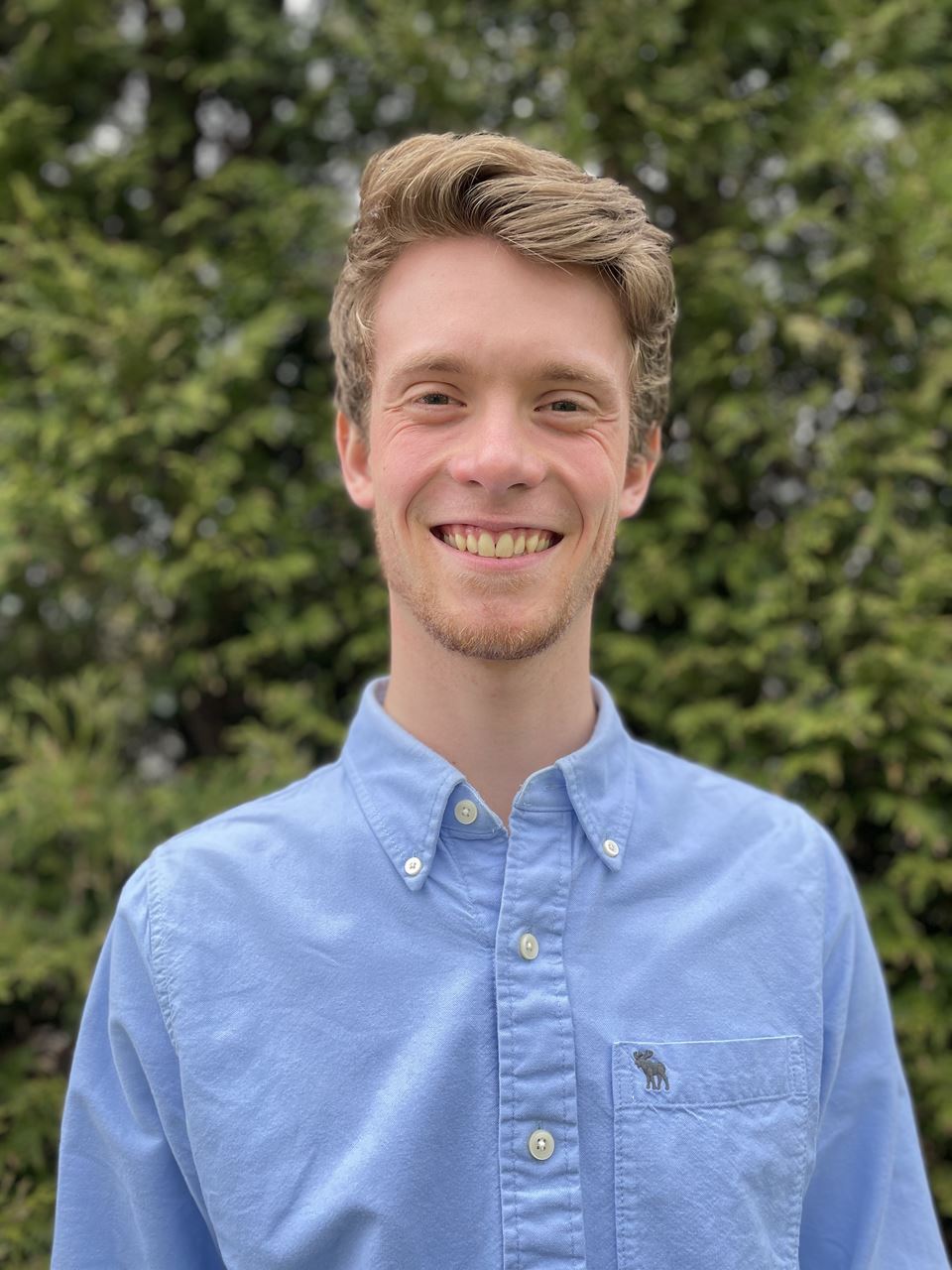 Sebastian is a go-getter. He has founded and leads a student Sustainable Design Team that meets weekly to examine green enhancements to campus landscaping, exploring ways to transform underutilized lawn space into an ecosystem with benefits such as food for the dining halls, learning experiences for students, and habitat for birds and insects. The team’s efforts are directed at the Carrden Food Forest Project, which will be an assemblage of food-bearing plants that works like an ecosystem, with very little maintenance once it is established, requiring minimal upkeep but producing food or other useful products. The team has worked with the Allegheny Student Government for funding, and after an initial approval by the college to develop a plan, has now begun a conversation with the administration to seek approval to install the design.
Sebastian is a go-getter. He has founded and leads a student Sustainable Design Team that meets weekly to examine green enhancements to campus landscaping, exploring ways to transform underutilized lawn space into an ecosystem with benefits such as food for the dining halls, learning experiences for students, and habitat for birds and insects. The team’s efforts are directed at the Carrden Food Forest Project, which will be an assemblage of food-bearing plants that works like an ecosystem, with very little maintenance once it is established, requiring minimal upkeep but producing food or other useful products. The team has worked with the Allegheny Student Government for funding, and after an initial approval by the college to develop a plan, has now begun a conversation with the administration to seek approval to install the design.
Sebastian also participated in a research methods course that partnered with the local French Creek Valley Conservancy (FCVC) to estimate deer browsing on conservancy properties. Sebastian helped to design this large study, collect the data, and analyze and summarize results, and based on his achievements in the course, he was invited to edit a report that was published as a technical report in the ESS department, and submitted to the FCVC, who stated the report will assist them in efforts to control effects of deer on tree seedling regeneration.
Sebastian takes his classroom learning and passion for environmental protection and truly champions sustainable solutions.
Philip Onffroy, Riley DeBaecke, Brooke Dickey, Jeffrey Gibbs, Prism Li, Rain Lu, Haley Scopelliti, and Kalie Yuen, Bucknell University
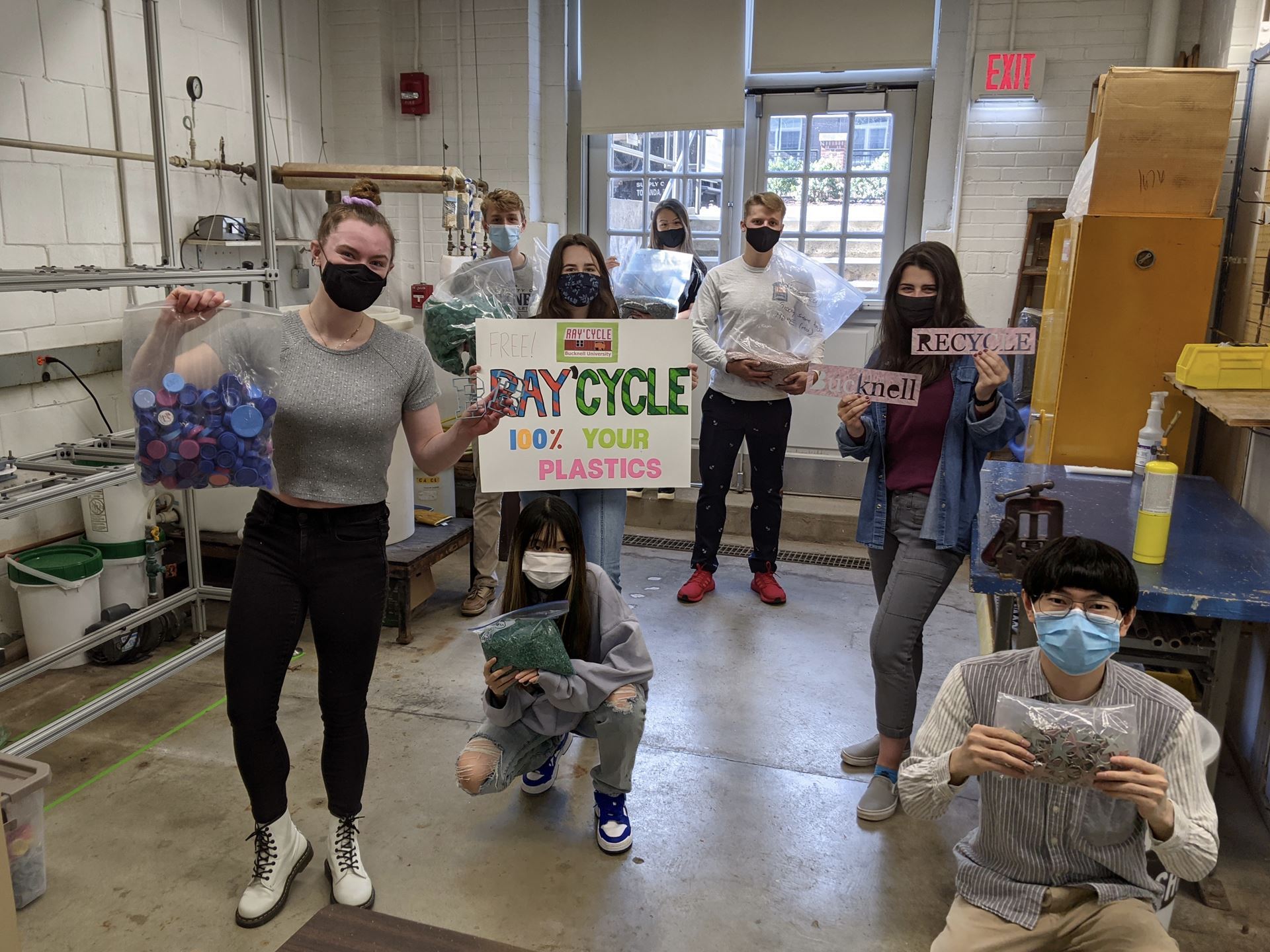 ‘Raycycle initiative started out of Professor Kat Wakabayashi’s polymer engineering research lab in March 2020, when the COVID-19 pandemic closed the Bucknell University campus. Eight research students (Philip Onffroy, Riley DeBaecke, Brooke Dickey, Jeffrey Gibbs, Prism Li, Rain Lu, Haley Scopelliti, and Kalie Yuen) decided to come together (‘Ray Bucknell!) to innovate while quarantining at home. With the general public use of disposable plastics (takeout containers, plastic bags, online shopping packaging) on the rise during the pandemic, Team ‘Raycycle decided to raise awareness of the consumption behavior and do its part in collecting and recycling some of the plastic materials, based on their research expertise. The team asked the Bucknell and surrounding community to take advantage of the stay-at-home period to collect several types of post-consumer plastics waste: grocery checkout bags, packaging air pillows, soda bottle caps, and single-use coffee pods. These plastic materials are often rejected at municipal and commercial recycling centers due to their cumbersome shapes and potential contamination levels.
‘Raycycle initiative started out of Professor Kat Wakabayashi’s polymer engineering research lab in March 2020, when the COVID-19 pandemic closed the Bucknell University campus. Eight research students (Philip Onffroy, Riley DeBaecke, Brooke Dickey, Jeffrey Gibbs, Prism Li, Rain Lu, Haley Scopelliti, and Kalie Yuen) decided to come together (‘Ray Bucknell!) to innovate while quarantining at home. With the general public use of disposable plastics (takeout containers, plastic bags, online shopping packaging) on the rise during the pandemic, Team ‘Raycycle decided to raise awareness of the consumption behavior and do its part in collecting and recycling some of the plastic materials, based on their research expertise. The team asked the Bucknell and surrounding community to take advantage of the stay-at-home period to collect several types of post-consumer plastics waste: grocery checkout bags, packaging air pillows, soda bottle caps, and single-use coffee pods. These plastic materials are often rejected at municipal and commercial recycling centers due to their cumbersome shapes and potential contamination levels.
The community-driven plastics collection started in the spring of 2020, and through the summer, 3800+ pieces of plastics waste were pledged. When Bucknell campus reopened in fall of 2020, Team ‘Raycycle combined individual contributions and re-processed these “difficult-to-recycle” plastic waste into Bucknell Bison-themed products such as keychains and cookie cutters. The 100% recycled plastic products are given back to the individual community contributors as token of appreciation, and further given out to the rest of campus at sustainability and environmental awareness events and venues. The ‘Raycycle initiative was Bucknell’s community engagement at its best, backed by student motivation and University’s patented plastics processing technology.
For more information, see: https://raycycle.scholar.bucknell.edu
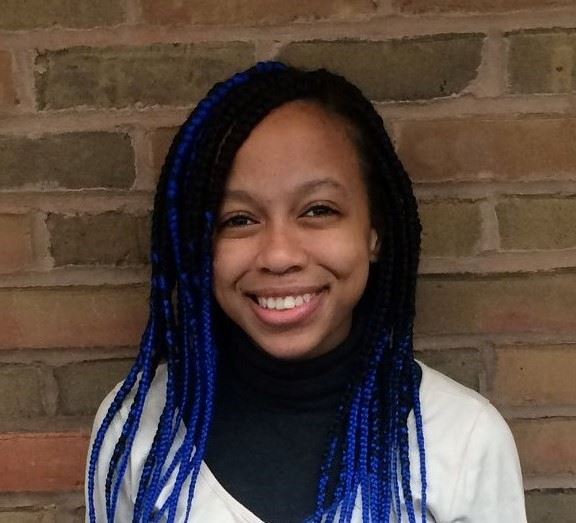 Gillian Williams, Franklin & Marshall College
Gillian Williams, Franklin & Marshall College
Gillian is a junior at Franklin & Marshall College, hailing from the sunny island of Jamaica. She is a double major in Biochemistry and Molecular Biology and Studio Art. She has been working for the Center for the Sustainable Environment for two years. At the CSE, Gillian primarily focuses on work related to environmental justice. One of her major projects is the Environmental Justice Speakers Series. In this work, Gillian has brought an exciting group of diverse speakers to campus, who have spoken on topics from Indigenous water rights to mountaintop removal mining to birding while black. In addition to this work, Gillian leads the CSE’s environmental book club, organizes environmental film screenings for the Green Cinema program, and assists in the organization of Sustainable Crafting events. She has been an incredible asset to the school’s environmental efforts.
Non-Student Winners:
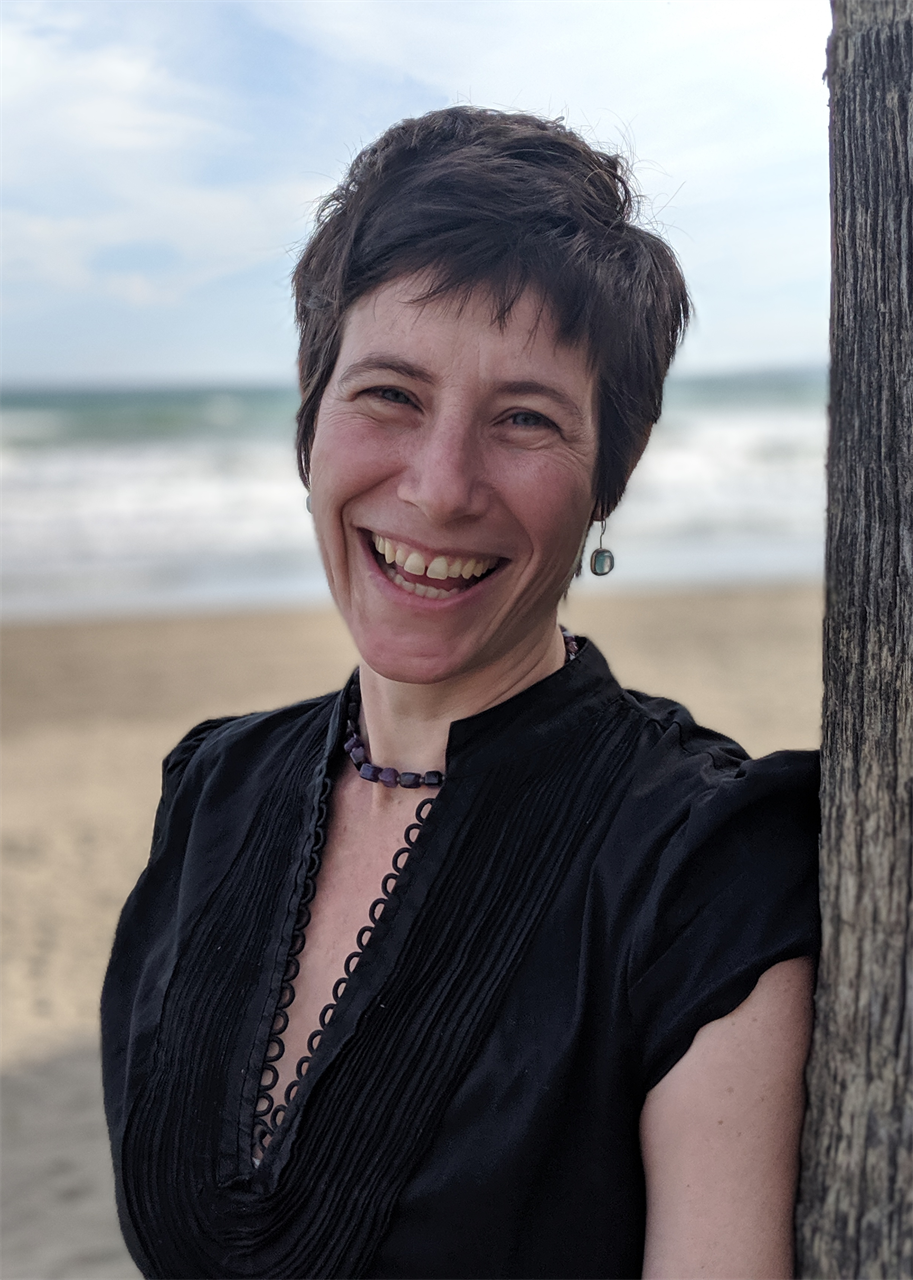 Eve Bratman, Franklin & Marshall College
Eve Bratman, Franklin & Marshall College
Dr. Bratman is an Assistant Professor in the Department of Earth & Environment. As a scholar, she is a political ecologist, drawing upon geography, anthropology, and development to explore how national and international sustainable development plans meet practice in people’s lives. In 2019 she published a book entitled Governing the Rainforest: Sustainable Development Politics in the Brazilian Amazon. It won the Lynton Keith Caldwell Prize of the American Political Science Association’s Science, Technology, and Environmental Policy (STEP) Section in 2020. The book is based on ten years of research concerning the links between development policies, infrastructure, conservation, and human rights in Brazil.
In addition to her research on sustainable development politics, her interests also include food systems, bicycling and inequality, and beekeeping. She currently serves as Chair of the Planning Commission for the City of Lancaster (PA). She is also involved in environmental justice and other sustainability initiatives in the local community. For her scholarly work, teaching, sustainable personal lifestyle, and community involvement. Dr. Bratman is a true sustainability champion for F&M!
Joy Charlton, Swarthmore College
As a long-time faculty member in the Sociology & Anthropology Department at Swarthmore College, Joy has been a dedicated advocate for campus sustainability. Joy played a key role in the formation of the College's Sustainability Committee, serving as one of the first chairs. She was also instrumental in hiring the College's first-ever sustainability coordinator, which eventually led to the formation of the Office of Sustainability and hiring of a sustainability director. Additionally, Joy previously served as the Executive Director of the Lang Center for Civic and Social Responsibility and has been a faculty co-instructor for the President's Sustainability Research Fellowship, guiding students as they take leadership over sustainability challenges. The Office of Sustainability staff and her colleagues across the College are deeply grateful for her contributions to campus sustainability and will dearly miss her presence after her retirement.
Mihyun Kang, The Pennsylvania State University
Mihyun Kang is the first Director for Sustainability in the College of Arts and Architecture at Penn State University. To institutionalize sustainability, she established the Sustainability Council comprising the college faculty, staff, and students from ground zero to fully functioning inaugural initiatives. The Sustainability Council created working groups focusing on teaching and learning, research, community engagement, and operations.
Regarding teaching and learning, she organized the Sustainability Teaching Roundtable Series to transform the culture of sustainability education and pedagogy. The Sustainability Faculty Teaching Fellows program was developed to enhance integrating sustainability competencies into courses and curriculum. Related to research, she organized the virtual Sustainability Research Symposium to highlight, connect, and amplify the college's sustainability research to foster collaboration with the Penn State Sustainability research community and beyond. It showed how we could respond and thrive in the COVID environment when virtual event becomes the primary mode of gathering and sharing. The Sustainability Research Team Grant was created to recognize and vitalize faculty members' teams for interdisciplinary sustainability research.
Initiatives in community engagement include the We are Sustainable video series. It features alumni, faculty, staff, and students reflecting on the role of sustainability in their work. To enhance college operation, she revitalized Penn State’s Green Teams and Green Paws efforts in the college. She is exploring with the operation group conducting Greenhouse Gas Inventories for the college. As such, she led the college's sustainability efforts, fostering collaboration with Penn State's Sustainability Institute.
A link to a website that provides additional information may be included: https://arts.psu.edu/research/sustainability/
Mark Sentesy, The Pennsylvania State University
Website: Home - Awaken State
In the fall of 2019, Dr. Sentesy co-founded Awaken State, a collective of Penn State students, faculty and staff focused on helping to foster a climate transition at the University. This group surveyed almost 1600 students to assess their concern about climate change and the extent to which they feel academically prepared to effectively address it. The survey revealed that students are very concerned and feel unprepared, but also showed that students trust their faculty to provide them with reliable and accurate information about climate change. These results highlighted the need for action and revealed an opportunity to do so in the context of the classroom. Mark and the team launched Climate Crossover Week to encourage faculty to devote at least one class to the topic of climate change. The group reached out across disciplinary boundaries to partner with faculty in other colleges, expanding the number of students at Penn State who are exposed to this topic. Mark and his team were awarded a SHAPE grant of $7,400 in 2020 from the SI in support of this effort. In spring 2020, 40 faculty joined reaching 1800 students.
Mark represents the College of Liberal Arts on the Stewarding Our Planet’s Resources Steering Committee, part of the University’s 2025 strategic planning effort. He is an active participant in the PSU Carbon Negative (CaN) group that is researching pathways for the University to achieve carbon neutrality. He has also been actively involved with the College of Liberal Arts Sustainability Council. He redesigned the Ethics of Climate Change course in 2019, and worked with curriculum designers to make the course available in on-line format so it would be available to more students across Penn State’s campuses. He compiled a 277-page course manual. Mark developed hundreds of study questions and made it easier for non-experts to teach climate science, ethics and solutions.
 Andrew Stuhl, Bucknell University
Andrew Stuhl, Bucknell University
Professor Andrew Stuhl is a campus sustainability champion because he remains bold in his convictions and consistently challenges the status quo throughout his work. As an academic, Dr. Stuhl engages in meaningful research to uncover connections between history, humanity, and the environment to better understand how we can create a better, cleaner, more just world moving forward. Most recently he's been engaged in a research project to document oral histories of Tropical Storm Agnes survivors to learn how we can better mitigate the damage from floods and other climate catastrophes that are to come. As a community member, Andrew is deeply engaged in direct organizing climate activism work with the Lewisburg hub of the Sunrise Movement. He established the hub in early 2019 to demand a shift in our campus energy system to move away from fossil fuels, as well as to fight for legislation in our local, state, and federal governments that transition our economy and infrastructure to become more sustainable while leaving no one behind. He recognizes that climate justice is social justice, and always incorporates equity and collective liberation into his work.
Terrence Xiao, Swarthmore College
As both a staff member and student, Terrence has proven himself a dedication campus sustainability champion as Swarthmore College. Terrence currently serves as a Sustainability and Engaged Scholarship Fellow for the Office of Sustainability and Lang Center for Civic and Social Responsibility. In his role, Terrence supports the President’s Sustainability Research Fellowship program, a high-impact learning program in which motivated students take stewardship over campus sustainability challenges. Terrence also plays a leadership role in the College’s zero waste efforts, working to improve waste management infrastructure and rethink material flows on campus, all with an emphasis on the environmental justice impacts of waste management.
Terrence graduated from Swarthmore as a member of the class of 2020, with a B.S. in Engineering and a B.A. in Environmental Studies. During his time as a student, Terrence was instrumental in advancing zero waste efforts on campus as a President's Sustainability Research Fellow.